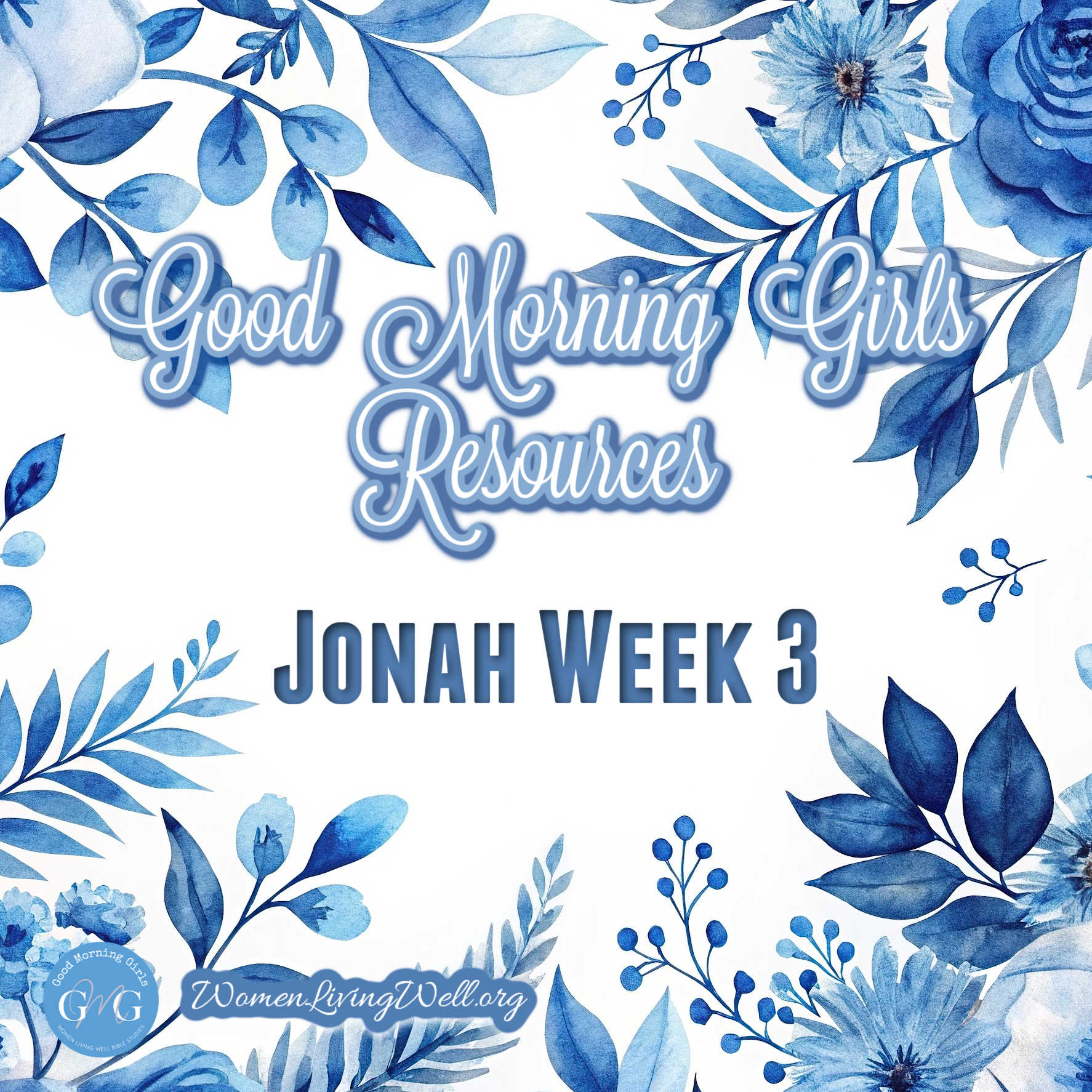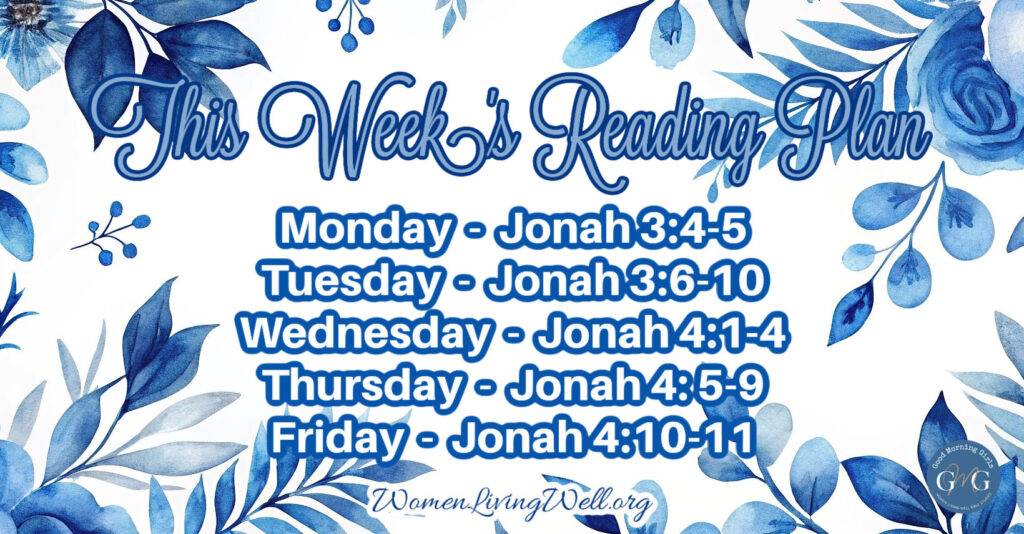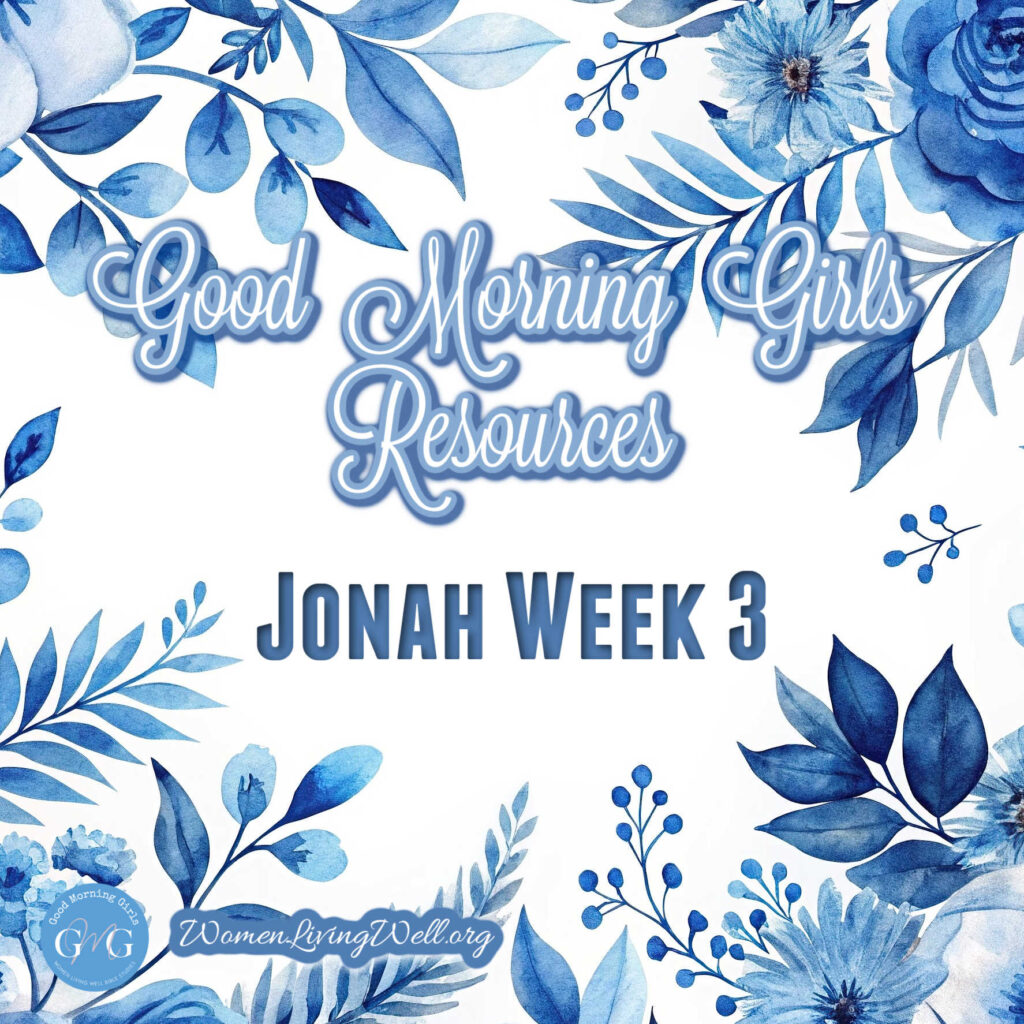
🎉 This is it! Our Final week in the Book Jonah!
Our daily discussions out on Facebook continue to be such a wonderful source of encouragement! If you haven’t joined us yet – I hope you will join us this week. It is such a blessing! 🥰
Here are the links to the last 2 week’s posts on the blog, in case you missed any of them:
Week 1 Intro and Resources for JonahGod’s Calling Feels Too Hard – Now What? (Based on Jonah 1 & 2)
NOW LET’S GET STARTED!
This Week’s Bible Reading Plan:
(Facebook Leaders: You can use this as your Facebook Header this week. Just right click and “save as” or screen shot it.)

This week’s Reflection & Discussion Questions
(Leaders: Copy and paste these into your groups. If you do not have a group, use these for a personal time of reflection.)
WEEK 3
Jonah 3:4-5
It is interesting that the people of Nineveh believed God. It doesn’t say they believed Jonah. They recognized Jonah’s words as being a word from God. But the city of Nineveh was notorious for its depravity and brutality. It is powerful to think about how the Assyrian people, who were so sinful believed God so rapidly.
It is likely that Jonah’s brief declaration, “Yet forty days, and Nineveh shall be overthrown” is not the only thing he cried out. However, we don’t read that he called the Ninevites to repentance or even gave them any hope that if they did turn from their sin, that God would spare them and their city. However, when they believed God, a fast was proclaimed and all the people put on sackcloth. Sackcloth was a bag-like garment that mourners would put on to signify sorrow and repentance.
The Ninevites immediately believed the word of God that Jonah proclaimed, and yet at that same period two prophets named Hosea and Amos were proclaiming God’s warning to the Israelites who refused to obey. The contrast we see between the people of Nineveh and the Israelites is astounding.
Repentance begins with believing what God says about our sin. 1 John 1:9 says, “If we confess our sins, he is faithful and just to forgive us our sins and to cleanse us from all unrighteousness.”
Do you have any unconfessed sin in your life today? Confess it to God. He will forgive and cleanse you. He loves you so much!
Jonah 3:6-10
When the king heard about Jonah’s message, he stood up, took off his royal garments, put on sackcloth, and sat in ashes. He fully humbled himself and then issued a proclamation throughout the whole city that both man and animal would fast and cry out to God for mercy. He said, “Who knows? God may turn and relent and turn his fierce anger, so we do not perish.”
The king also proclaimed, “Let every man turn from his evil way and from the violence that is in his hands.” This call for repentance was not just an outward change of behavior, but an inward change of the heart. Repentance is not just changing what we do, but it is changing the way we think about our sin. It’s choosing to agree with God about our sin and the seriousness of our disobedience to him.
Our sin may not be to the level of the sin of the Ninevites, but this does not make our sin any less serious to God. He does not overlook small sins anymore than he overlooks big sins. He is a just God, and he must punish sin, or he wouldn’t be just. But when we choose to come into agreement with him about sin, he is merciful to us!
God saw the repentance of the Ninevites, and he relented. This does not mean that God changed his mind. The Hebrew word in this verse means that he had compassion upon them, and he chose not to punish them because they repented.
Oh, what great grace and compassion our Father has for us. He loves you so much! In what ways have you experienced God’s mercy in your life? Write below about how you have experienced God’s compassion.
Jonah 4:1-4
Instead of the book of Jonah ending on a high note, with the happy ending of the city of Nineveh being spared and God’s mercy being poured out, it continues. Verse one says that God’s mercy toward Nineveh displeased Jonah, and he was angry. Jonah did not go to Nineveh to call the people to repentance, but to eagerly declare that God was going to smite them in his judgement.
Verse two is even more revealing as Jonah lashes out at God. He knew God to be gracious and merciful, so when he heard God’s call, he chose to flee to Tarshish because he did not want the Ninevites to have the opportunity to repent. He did not want God to have the opportunity to be merciful to them.
This is how much Jonah hated the Assyrians. He grew so angry that he wanted to die; and God’s reply to him was, “Do you feel you have the right to be angry?” Jonah had experienced God’s forgiveness and mercy yet was unwilling to extend that same forgiveness and mercy to his enemies.
Has there been a time in your life when you witnessed God blessing someone you felt should have experienced consequences instead? Did you, like Jonah, become angry with God that they seemed to escape God’s judgement? If you are still upset about this, release that anger to the Lord. Cry out to him and ask him to take away the sting of pain you feel for whatever that person has done and let him fill you with his supernatural love and peace.
Jonah 4:5-9
Still hoping that God would judge the Ninevites, despite his mercy and grace, Jonah left the city and went to a place where he could sit and watch what would happen. As he sat there, God caused a plant to grow that brought shade and a bit of relief from the hot sun. However, the next morning, God caused a worm to attack the plant, and it withered and died. Then God sent a scorching wind, and the sun beat down on him causing him to feel faint.
Once again, Jonah wanted to die. God confronts Jonah a second time with the question, “Do you have a right to feel angry?” This time, God is referring to the plant – but perhaps he’s not really talking about the plant. God used the plant as an object lesson in Jonah’s life to teach him about his sovereignty.
In his pride, Jonah felt justified in his anger towards the Assyrians. They had terrorized his people. He didn’t feel they deserved God’s mercy. However, he felt he did deserve God’s mercy so much so that when God caused the plant to die, he felt he had been defrauded in some way. He was a victim of God’s injustice.
The Ninevites received a level of God’s mercy he did not feel he was being given. It wasn’t fair; and God’s confrontation was like salt in the wound.
Has there been a time when you felt God wasn’t being fair to you? Has there been a situation in which you felt God should have blessed you, but instead of blessing you felt disciplined? Were you angry with God? In what ways has God been merciful to you when you didn’t deserve it? Take a moment and thank him for his undeserved love and mercy in your life.
Jonah 4:10-11
While the final verses of the book of Jonah may seem like a strange ending to this book, they are a powerful illustration of the indescribable depths of God’s love and compassion for mankind.
God had sent prophet after prophet to Israel and Judah to warn them of their sinful ways and God’s impending judgement. While there had been periods of repentance, their change was not lasting. Eventually both nations would be destroyed and their people carried away into captivity. God had been incredibly long-suffering with his people who had his Law and the prophets to make them aware of their sin.
Nineveh, on the other hand, while certainly not guiltless, did not have God’s Law. They did not have prophets who would warn them of their sin. They were hopelessly lost and incapable of escaping God’s judgement. In verse ten, God confronts Jonah a third time, explaining to him how he showed more compassion and care for the plant than he did for the 120,000 people of Nineveh who could have been wiped out in God’s judgement.
God wanted Jonah to realize the absurdity of his anger about the plant in comparison with his lack of compassion for a city of people who had been created in God’s image. It didn’t matter to God that they were Gentiles. Though they were enemies of his people, they had believed his word and repented, and God had compassion on them.
This is the indescribable depth of God’s love and mercy for us today. Though we have sinned and fallen short of his glory, when we believe his word and repent, he will show his compassion toward us and receive us in his love and mercy.
Do you know someone who needs salvation? Let’s close out our study by praying for those in our lives who do not know the Lord yet. Pray that God would give you an opportunity to share with them God’s love and mercy, and that they will believe and repent. Keep walking with the King!
This Week’s Verses of the Day:
(Leaders: You can use these images in your groups by using right click and “save as” or screen shoting them.)
Monday
Tuesday
Wednesday
Thursday
Friday
Here’s the Printable Bible Bookmark for Jonah.
☕️ 📖 ✍️ Now, let’s get started! Grab a cup of coffee or your favorite drink and open your Bible and SOAK it in! Be sure to leave at least 15-20 minutes for your reading each day.

Don’t Miss the Daily Check-Ins on Facebook!
Join us EVERY weekday morning ANYTIME after 7:00amEST on Facebook
to discuss the day’s reading assignment.

Have a wonderful week in God’s Word – I’ll see you back here on the blog this Friday for our final wrap-up of the book of Jonah!
Don’t forget to join me every weekday morning out on Facebook!
Keep walking with the King,
COURTNEY
Did you miss last week’s new video? Here it is again: Is God Trying to Get Your Attention?
The Jonah Journal is available on Amazon!
If you’d like to purchase a printable-digital copy
(so you have it right away) at half the price
click HERE.















